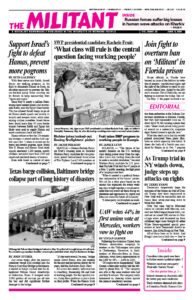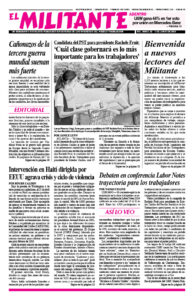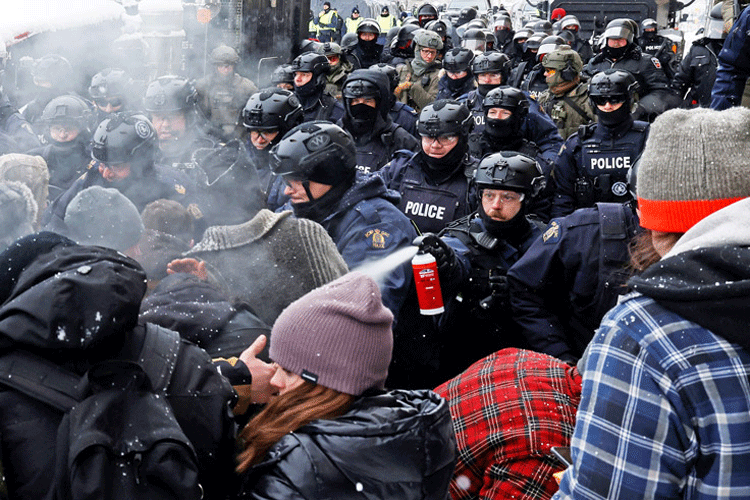MONTREAL — The Canadian government of Liberal Prime Minister Justin Trudeau has introduced Bills 70 and 63 before Parliament. If adopted, they would deal further blows to the political rights of working people.
These attacks are the latest steps taken by Canada’s capitalist rulers to reduce the political space working people need to defend ourselves against the impact of today’s world capitalist economic and social crisis. They build on Ottawa’s use of the draconian Emergencies Act in February 2022 to crush the truckers’ Freedom Convoy protest in the capital.
Public Safety Minister Dominic LeBlanc tabled Bill 70 May 6. It would establish a registry of “foreign agents” and make it a crime — punishable by up to life in prison — to engage in “surreptitious or deceptive conduct” at the direction of a foreign government with the goal of “harming Canadian interests.”
This follows months of controversy into whether there was foreign interference in the last federal elections in 2019 and 2021.
For decades working-class fighters in many capitalist countries have faced similar attacks on political rights. On the eve of World War II, the imperialist rulers in Washington passed the Foreign Agents Registration Act and used it against labor and anti-war groups.
Similar laws are being used by the Vladimir Putin regime in Russia against opponents of his war on Ukraine, and have just been adopted by the Moscow-aligned government in Georgia.
Washington used its law to target the Communist Party, the Socialist Workers Party and others during the McCarthy anti-communist witch hunt in the 1950s.
In 1998, five Cuban revolutionaries who were monitoring counterrevolutionary Cuban emigres planning attacks on socialist Cuba from the U.S. were arrested by the FBI and charged with being “unregistered foreign agents.” The Cuban Five spent up to 16 years in federal prisons on this and other charges before being released after an international campaign to win their freedom.
Bill 70 also includes a new criminal offense for use against anyone who allegedly interferes with access to or the functioning of “essential infrastructures,” such as railroads, ports and highways. The Canadian Civil Liberties Association warns this could be used to “suppress protests” and is “a serious risk to freedom of expression.”
Big-business associations across Canada have been clamoring for Ottawa to act to prevent rail and port workers, such as those at Canadian National and Canadian Pacific Kansas City railroads, from striking. The rail workers have voted by over 97% to strike and the Montreal port workers recently rejected a proposed contract by 99.5%.
When Prime Minister Trudeau invoked the Emergencies Act against the truckers who had set up an encampment in Ottawa to protest federal COVID mandates that threatened their jobs, government ministers argued that Canada’s “national security” was threatened by the economic impact of the protest.
In an important victory for the rights of working people, Federal Court Justice Richard Mosley ruled Jan. 23 that Ottawa’s use of the Emergencies Act was illegal. Ottawa is appealing this decision to the Supreme Court.
Despite the court ruling, the government’s frame-up trials against leaders of the Freedom Convoy — including Tamara Lich, Chris Barber and Pat King — continue.
More attacks on political rights
Bill 70 comes on top of Bill 63, the Online Harms Act, introduced in February under the cynical guise of protecting children from pornography. The law contains sweeping measures to strengthen existing “anti-hate laws” and impose government censorship over the internet. It would increase prison sentences of up to life in prison for anyone convicted of an offense “motivated by hatred.”
On April 10 the Quebec government of Premier Francois Legault introduced Bill 57, an act “to Protect Elected Officers and to Facilitate the Unhindered Exercise of their Functions.” It makes it illegal for anyone to “obstruct” an elected Quebec official by threatening, harassing or intimidating them, levying fines up to 1,500 Canadian dollars ($1,095).
Quebec’s four union federations responded, charging the proposed bill “could have the effect of criminalizing the democratic participation of citizens and undermining their freedom of expression.”
“Historically the labor movement has often been the target of legislation aimed at suppressing anti-government dissent, including times when workers have demanded better living conditions through strike actions,” the Ontario Public Service Employees Union said several days after Ottawa invoked the Emergencies Act against the truckers’ protest.
“To protect the political space we need to organize to defend our class interests, the unions need to lead a fight by all supporters of political rights to prevent these anti-working-class laws from being adopted,” said Katy LeRougetel, Communist League candidate in the federal by-election in Montreal. “We must demand that the frame-up trials of the Freedom Convoy leaders be ended and all charges against participants in the truckers’ protest be dropped.”


